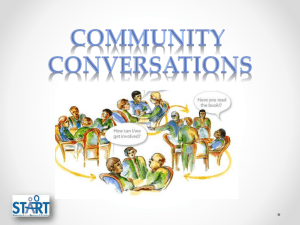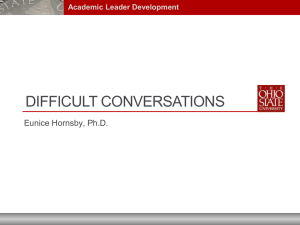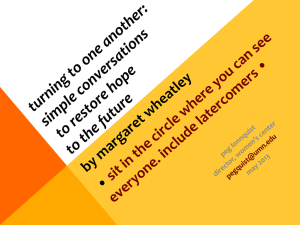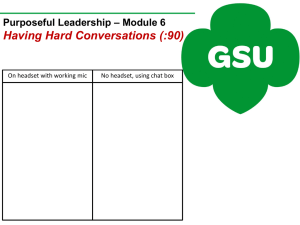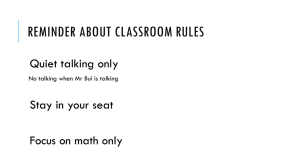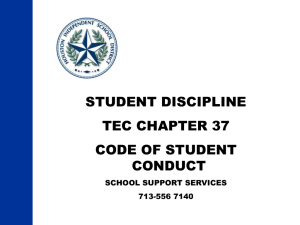Prepare leaders and teachers for difficult conversations
advertisement
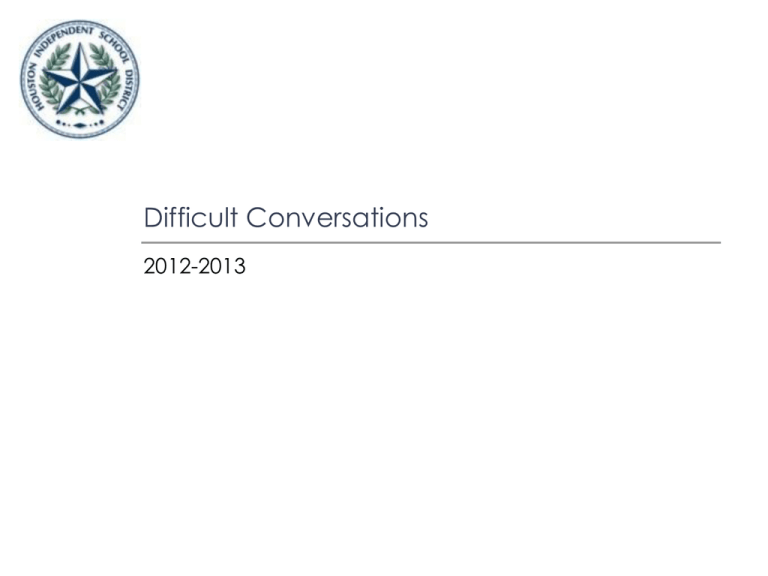
Difficult Conversations 2012-2013 Session Objectives During this session, we will . . . Introduce five best practices that will increase appraiser confidence when navigating difficult conversations concerning appraisal ratings. Build appraiser skill by using best practices to execute difficult conversations for 5 common scenarios. 2 Objective #1: Introduce five best practices that will increase appraiser confidence when navigating difficult conversations concerning appraisal ratings 3 Improving your effectiveness to execute difficult conversations is directly related to priorities 1 and 3. Priorities 1. PROVIDE TEACHERS WITH ACCURATE APPRAISAL RATINGS through frequent observations and with a shared understanding of the expectations in the Instructional Practice rubric and . . . 2. IMPLEMENT THE STUDENT PERFORMANCE COMPONENT to determine whether teachers’ instruction is having a positive impact on student learning to help . . . 3. IDENTIFY APPROPRIATE DEVELOPMENT NEEDS AND OPPORTUNITIES FOR EVERY TEACHER and provide useful feedback to drive continuous improvement. All of the above ensures that we have enough information to . . . 4. MAKE SMART RETENTION DECISIONS where low performing teachers aren’t left in the classroom and the best teachers stay. 4 Even though there are many factors that make sharing feedback difficult for school leaders, it is a process that employees value and respond positively to. Relationships Time Morale Experience Factors that make sharing feedback more difficult Feelings Impact Manager knowledge / skill A 2009 Gallup Inc. study of over 1,000 US bases employees found that those who received predominantly negative feedback from their manager were over 20 times more likely to be engaged than those receiving little or no feedback. 5 Teachers crave constructive feedback, even though it may make for a difficult conversation at times. “I would have liked her to be more critical of my teaching. I have never received any constructive feedback, only lists of things she likes about my teaching. This is only my second year teaching, and I have many things I know I can improve on.” - HISD Teacher “This feedback needs to be constructive with great, thought-out examples for the teacher to see how they are to change. ” - HISD Teacher “I don't feel like I was provided much feedback on how to improve. Even though I had a good rating, I would still like to improve and be told how I can do so.” - HISD Teacher Source: 2011-2012 End-of-Year Appraisal and Development Teacher Survey 6 We know a lot about what makes feedback conversations more effective regardless of difficulty. Feedback is not about the manager. Feedback is more effective the sooner it is given. Feedback is about the future. Feedback is about behavior not motivation or attitude. Feedback is a sign of strong leadership. 7 Horstman, Mark and Auzenne, Mike. Manager Tools. 2012 Practices That Make Conversations Less Difficult Set Expectations Early Do It Often Plan Utilize Evidence 8 Horstman, Mark and Auzenne, Mike. Manager Tools. 2012 Set Expectations Early • How do you communicate expectations to teachers? • What role do the expectations play in the conversation? • What is the impact? 9 Do It Often • No news is good news • Breathe easy • Practice makes perfect Which of these resonates most with you? Why? What are some steps that come to mind that you could/will take to ensure you “Do It Often”? 10 Horstman, Mark and Auzenne, Mike. Manager Tools. 2012 Plan • Determine your key messages before the conversation • Have an approach 1. What is your typical approach? 2. How does the recommended approach differ/align with what you typically do? Horstman, Mark and Auzenne, Mike. Manager Tools. 2012 11 Utilize Evidence • Talk about the behavior not about attitude or motivation • Reference low-inference evidence Horstman, Mark and Auzenne, Mike. Manager Tools. 2012 12 Low-Inference Evidence Low-inference evidence refers to things you see and hear. 13 Objective #2: Build appraiser skill by using best practices to execute difficult conversations for 5 common scenarios 14 2 minutes PLANNING 3 minutes ROLE PLAY 3 minutes HOT SEAT 3 minutes FEEDBACK 15 HOT SEAT #1 Poor performance/Great attitude and effort You are meeting with a teacher for a feedback conversation. You observed the teacher earlier today and this is what you observed. (click here to view video) The criterion area that stand out as your biggest concern is her ability to communicate concepts clearly (I-6). Even though she did not consistently communicate the key points of the lesson, you know she has really been working on her skills in this area, is liked by all the teachers on campus, is a coach for the soccer team, and parents think she is very kind. 2 minutes PLANNING • Based on your observation what low-inference evidence do you have in I-6 to show that the teacher is at a level 2? • What specifically is the teacher missing to rate her a level 3?” 3 minutes ROLE PLAY 3 minutes HOT SEAT 3 minutes FEEDBACK 16 HOT SEAT #2 Does not agree with feedback You are meeting with a teacher for a feedback conversation. You observed the teacher earlier today and you have rated him a 2 in the I-8 criterion (students actively participating in the lesson activities). During the conference , you share your feedback and he begins to argue with the rating and says he does not agree. 2 minutes 3 minutes 3 minutes PLANNING ROLE PLAY HOT SEAT 3 minutes FEEDBACK 17 HOT SEAT #3 Getting a lower rating this year than last year You are meeting with a teacher for a feedback conversation. You observed the teacher earlier today and you have scored him a level 1 in the I-3 criterion (differentiates instruction for student needs by employing a variety of instructional strategies) when last year he was rated a 3. He shared with you that he is not doing anything differently this year, but you are confident that your rating is accurate because you collected low-inference evidence from the classroom observation (all students were assigned the same vocabulary activity, all students stayed in their own desks during independent practice, and when students finished they were all asked to start on their homework) that supports your rating. 2 minutes 3 minutes PLANNING ROLE PLAY 3 minutes 3 minutes HOT SEAT FEEDBACK 18 HOT SEAT #4 Poor performance/Strong relationship You are meeting with a teacher for a feedback conversation. You observed the teacher earlier today and you have rated her a 2 in criterion I-2 (checks for student understanding). She asked 5 questions of her students, but did not adjust the lesson when students answered incorrectly. The teacher said “no, that is not the right answer” and moved on to another student. She did this for 4/5 questions asked. This teacher has been teaching on your campus with you for 8 years and you have built an amazing friendship. She even attended your son’s birthday party last year. 2 minutes 3 minutes PLANNING ROLE PLAY 3 minutes HOT SEAT 3 minutes FEEDBACK 19 Closing • What will you take with you from this session? • How does this help you to achieve more accurate ratings? 20
